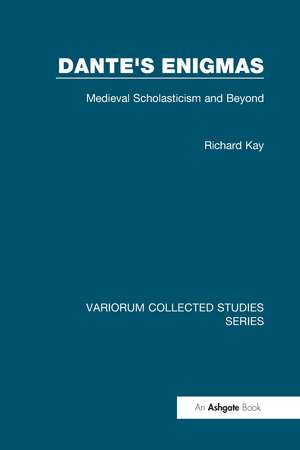Dante's Enigmas: Medieval Scholasticism and Beyond: Variorum Collected Studies
Autor Richard Kayen Limba Engleză Hardback – 28 sep 2006
Din seria Variorum Collected Studies
- 9%
 Preț: 938.85 lei
Preț: 938.85 lei -
 Preț: 311.41 lei
Preț: 311.41 lei -
 Preț: 351.48 lei
Preț: 351.48 lei -
 Preț: 313.38 lei
Preț: 313.38 lei -
 Preț: 386.77 lei
Preț: 386.77 lei -
 Preț: 325.68 lei
Preț: 325.68 lei -
 Preț: 396.00 lei
Preț: 396.00 lei -
 Preț: 312.75 lei
Preț: 312.75 lei - 9%
 Preț: 1041.23 lei
Preț: 1041.23 lei -
 Preț: 258.66 lei
Preț: 258.66 lei -
 Preț: 299.55 lei
Preț: 299.55 lei - 9%
 Preț: 938.08 lei
Preț: 938.08 lei -
 Preț: 343.33 lei
Preț: 343.33 lei -
 Preț: 311.18 lei
Preț: 311.18 lei - 9%
 Preț: 937.13 lei
Preț: 937.13 lei -
 Preț: 351.41 lei
Preț: 351.41 lei -
 Preț: 320.00 lei
Preț: 320.00 lei - 34%
 Preț: 764.20 lei
Preț: 764.20 lei - 23%
 Preț: 315.48 lei
Preț: 315.48 lei - 36%
 Preț: 740.06 lei
Preț: 740.06 lei - 34%
 Preț: 764.20 lei
Preț: 764.20 lei - 34%
 Preț: 680.73 lei
Preț: 680.73 lei - 26%
 Preț: 247.40 lei
Preț: 247.40 lei - 34%
 Preț: 485.78 lei
Preț: 485.78 lei - 38%
 Preț: 766.91 lei
Preț: 766.91 lei - 34%
 Preț: 767.07 lei
Preț: 767.07 lei - 34%
 Preț: 764.20 lei
Preț: 764.20 lei - 34%
 Preț: 769.51 lei
Preț: 769.51 lei - 38%
 Preț: 769.85 lei
Preț: 769.85 lei - 34%
 Preț: 826.68 lei
Preț: 826.68 lei - 25%
 Preț: 225.28 lei
Preț: 225.28 lei - 25%
 Preț: 225.54 lei
Preț: 225.54 lei - 34%
 Preț: 736.38 lei
Preț: 736.38 lei - 34%
 Preț: 738.43 lei
Preț: 738.43 lei - 25%
 Preț: 226.52 lei
Preț: 226.52 lei - 33%
 Preț: 491.66 lei
Preț: 491.66 lei - 34%
 Preț: 485.78 lei
Preț: 485.78 lei - 34%
 Preț: 485.78 lei
Preț: 485.78 lei - 36%
 Preț: 739.17 lei
Preț: 739.17 lei - 38%
 Preț: 766.34 lei
Preț: 766.34 lei - 31%
 Preț: 473.94 lei
Preț: 473.94 lei - 18%
 Preț: 843.61 lei
Preț: 843.61 lei - 38%
 Preț: 774.91 lei
Preț: 774.91 lei - 38%
 Preț: 769.92 lei
Preț: 769.92 lei - 34%
 Preț: 764.20 lei
Preț: 764.20 lei - 51%
 Preț: 485.78 lei
Preț: 485.78 lei - 36%
 Preț: 488.49 lei
Preț: 488.49 lei - 34%
 Preț: 769.10 lei
Preț: 769.10 lei - 38%
 Preț: 766.99 lei
Preț: 766.99 lei - 18%
 Preț: 1019.01 lei
Preț: 1019.01 lei
Preț: 524.78 lei
Preț vechi: 789.95 lei
-34% Nou
Puncte Express: 787
Preț estimativ în valută:
100.41€ • 105.12$ • 83.09£
100.41€ • 105.12$ • 83.09£
Comandă specială
Livrare economică 17-31 martie
Doresc să fiu notificat când acest titlu va fi disponibil:
Se trimite...
Preluare comenzi: 021 569.72.76
Specificații
ISBN-13: 9780860789840
ISBN-10: 0860789845
Pagini: 352
Dimensiuni: 150 x 224 x 19 mm
Greutate: 0.45 kg
Ediția:ILL
Editura: Taylor & Francis
Colecția Routledge
Seria Variorum Collected Studies
Locul publicării:Oxford, United Kingdom
ISBN-10: 0860789845
Pagini: 352
Dimensiuni: 150 x 224 x 19 mm
Greutate: 0.45 kg
Ediția:ILL
Editura: Taylor & Francis
Colecția Routledge
Seria Variorum Collected Studies
Locul publicării:Oxford, United Kingdom
Cuprins
Contents: Preface; Rucco di Cambio de' Mozzi in France and England; The sin(s) of Brunetto Latini; The Pope's wife: allegory as allegation in Inferno 19.106-111; Dante's double damnation of Manto; The spare ribs of Dante's Michael Scot; Two pairs of tricks: Ulysses and Guido in Dante's Inferno XXVI-XXVII; Vitruvius and Dante's giants; Dante's razor and Gratian's D. XV; Dante's prophecy of peripety (Par. 27.142-148): an astrological fortuna; Unwintering January (Dante, Paradiso 27.142-143); Dante's empyrean and the eye of God; Vitruvius and Dante's Imago dei; Dante in ecstasy: Paradiso 33 and Bernard of Clairvaux; Flash or effulgence? Mental illumination in Dante's Paradiso 33.141; Parallel cantos in Dante's Commedia; Dante's acrostic allegations: Inferno XI-XII ; Dante's acrostic allegations: Inferno XI; Dante's acrostic allegations: Inferno XII; An acrostic allegation in Dante's Vita nuova; Il giorno della nascita di Dante e la dipartita di Beatrice; Indexes.
Notă biografică
Richard Kay is Emeritus Professor in the Department of History, University of Kansas, USA
Descriere
Historical context frames Richard Kay's readings of some of the enigmas in Dante's Divine Comedy. These relate the poem to such standard sources as the Bible, Aristotle, Aquinas, and the Latin classics, but also go beyond these Scholastic sources to exploit Dante's use of less familiar aspects of Latin clerical culture, including physiognomy, Vitruvian proportions, and optics, and most especially astrology. Kay explores new ways to read the Comedy, investigating acrostics, parallelisms between cantos of Purgatorio and Paradiso, and aspects of the poem's finale in the Empyrean.
